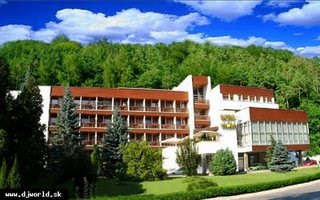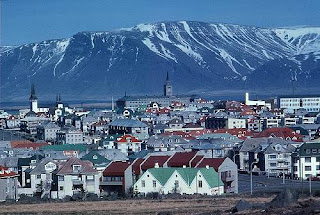
Dibelius said that in hindsight looks like the financial "industry greedy, selfish and cut off from reality, as if the company is totally beyond." He admitted that the financial sector failed.







 Benchmark crude for April delivery fell 80 cents at 44.44 pound a barrel on the New York Mercantile Exchange.
Benchmark crude for April delivery fell 80 cents at 44.44 pound a barrel on the New York Mercantile Exchange.
 From the application of euro als national currency in Slovakia in 1. January 2009 flowed more than 100 days.
From the application of euro als national currency in Slovakia in 1. January 2009 flowed more than 100 days.



Vojany thermal power plant to start unit 6 by end of May
Electricity generator Slovenské Elektrárne (SE) will re-launch unit 6 of its thermal power plant at Vojany in the Košice region, which caught fire on April 14, by the end of May.
The starting date for unit 5, which was more severely damaged by the fire, is not yet known. The fire broke out in a turbine in the power plant shortly after 21:00 on April 14.
Economy Minister Ľubomír Jahnátek said at a press conference the day after the outage that units 5 and 6 had been put in “cold storage”. As many Slovak companies are operating at a reduced level at the current time there is sufficient electrical power on the Slovak market.
This is a temporary phenomenon. Of course, when industry is running at full steam we'll feel the lack of this generator.
Slovak economy to shrink by 0.9% in 2009
Slovakia's economy is heading for a contraction of 0.9 percent this year, claims Irish market-research consultancy Research and Markets, whose economic forecast for the country in 2009 is still considerably more upbeat than that of the Slovak central bank (NBS).
“We don't believe that Slovakia will avoid a recession and predict that the country's gross domestic product will fall by a real 0.9 percent in
The latest NBS forecast published two weeks ago forecast that Slovakia’s GDP would shrink by 2.4 percent in 2009. According to the Irish company, a reduction in foreign demand and falling consumer confidence will have a major impact on exports and household consumption. Research and Markets expects the Slovak economy to recover next year, with GDP growth of 2 percent.


The owner of the Bratislava Culture and Leisure Park (PKO), Henbury Deveploment, s.r.o., is continuing work to repair the exterior and interior parts of the venue’s Vaudeville Hall which was damaged during short-lived demolition works on April 14.
The investor was thereby fulfilling a pledge given in return for the city council prolonging the validity of the company’s demolition permit, which was originally due to expire April 19, 2009. The city had asked the Construction Office of the Bratislava Old Town district to prolong the licence until the end of 2011; Old Town Mayor Andrej Petrek signed a new licence, valid until the end of 2011, on April 15.
PKO was built between 1940 and

 When taxpayer can´t play tax to the end of March, he can unquire Board of Inland Revenue for settlement of the tax by installments. In the demand must he point the reason, why he can´t pay tax.
When taxpayer can´t play tax to the end of March, he can unquire Board of Inland Revenue for settlement of the tax by installments. In the demand must he point the reason, why he can´t pay tax. 
Slovak banks need no state aid
Slovakia is a country whose banking sector is among the least affected by the current global financial crisis.
The sector enjoys high profits and liquidity, stable interest rates from credits – including those on the interbank market – as well as the low exposure of Slovak banks to risk assets.
The Slovak banking sector was highly profitable in 2008, with sufficient liquidity and without any need for special state aid programmes.
The risk that Slovak banks face the most now concerns the ability of enterprises to settle their debts stemming from loans.
According to the ministry, the initiative lays the groundwork for providing possible stabilisation aid to a bank afflicted by the global crisis. The assistance would feature the state depositing financial assets into a bank's basic capital, or it could be a state guarantee for bonds issued by the bank or a loan provided to the bank.

Around 3,500 cars already registered for stage II scrapping bonus
More than 3,500 cars had already been registered for the scrapyard contribution programme, according to Car Industry Association data released on Monday, April 6 - the day when the second round of the programme designed to see old cars replaced with new ones began.
This could mean that the budget earmarked by the government for 22,100 vehicles will last for only a few days. The first round lasted from March 9 to March 25 and €33.2 million was spent; the Government decided last week to up the amount of money by an additional €22.1 million. The rules for the second round are different.



The second round of the car-scrapping
The government is to allocate €22.1 million to a second round of the so-called car-scrapping bonus, due to be launched on Monday, April 6.This involves state support for people who scrap an old car and replace it with a new one.However, the rules for the second round are different from the first. The state will contribute €1,000 if the seller [of the new car] provides €1,000. In the first round, which took lasted from March 9 and March 25, the basic contribution from the state was €1,000, but if car dealers contributed another €500, the state subsidy was increased to €1,500. The maximum value of a new car for which the measure applies will remain at €25,000.The second round of the car-scrapping bonus will be the last one.As many as 672 cars were scrapped in the first round in the period immediately after the budget allocation had been used up. The 2,400 applicants who took their cars to scrapyards or took them home but were put on a waiting list on Wednesday or Thursday will also come under the provisions for the first round.



British investment brings jobs to Veľký Meder
The British company RPC Bramlage plans to invest €1.255 million into production of plastic materials in Veľký Meder, a municipality in the Dunajská Streda district. The investment should create 88 job positions.
The company has already transmitted in its investment plan for an Environmental Impact Assessment. They plan to start production as early as the end of April 2009, as a successor to the DM Plast company.
RPC Bramlage was forced to close its plant in the Netherlands due to the global economic crisis and moved eastwards, to Slovakia. The company focuses on production of packages for the cosmetic, pharmaceutical and food industry.


Henkel Slovensko to create 150 new jobs in Bratislava
Producer Henkel Slovensko has decided to expand its Shared Services Centre in Bratislava.
The centre should create 150 new jobs within the next two years. Company director Juraj Lackovič said that it will be possible to expand the centre only if the company manages to find an additional 150 professionals with language skills. Mayor of Bratislava Andrej Ďurkovský said that this move is completely in line with the local authority's goal of boosting Bratislava's role as a knowledge-based city. He promised that city officials will co-operate in the project. Lackovič also said that the company's latest project is to set up a Purchase Competence Centre in Bratislava that will co-ordinate purchases of direct and indirect materials and logistics, while concentrating mainly on Western Europe. The company established its service centre in Bratislava in 2007. The centre manages selected financial and accounting operations for the company in 23 countries including the US and Canada. The goal is to extend this service to 25 countries.

Nitra River redirected for an area extraction of brown coal
The flow of the Nitra River was redirected to a new river bed in Opatovce nad Nitrou in the district of Prievidza on March 24. The redirection was made to open up an area for extraction of brown coal, used for energy purposes. The redirection will enable the mining company Hornonitrianske Bane of Prievidza to continue extracting coals for several more years and give jobs to about 4,000 people in the region.
The current investment amounts to €36.513 million. The new river bed is






Retail chains prefer foreign dairy products
Slovak milk and dairy products should be more widely represented on the shelves of large retail chains doing business in Slovakia, according to the Slovak Agriculture and Food Chamber (SPPK). Milan Semančík, provided the results of a supply-chain survey it conducted at Tesco hypermarkets, at the Lidl discount chain and at CO-OP Jednota stores in Bratislava between March 10 and 17.
The survey showed that only 41.9 percent of total dairy products in the stores were domestically produced. This could be one of the reasons why milk consumption is low in Slovakia, one of the lowest in the EU.
SPPK found that the lowest share of Slovak dairy products was in Lidl stores – just 19.5 percent, with German and Czech products making up as much as 63.7 percent.At the same time, domestic dairy products in Lidl stores in the Czech Republic made up 47.2 percent of the total, with Slovak products reaching only 3.5 percent. The current practices of large retail chains are increasing Slovakia's negative trade balance for agricultural and food commodities, which rose by 15.3 percent last year.

 Prices of the natural gas for households could decrease. Minister of Economy Lubomir Jahnatek (Smer-SD) admitted this in discussion programme of Slovak Television “ O 5 minut 12“ today.
Prices of the natural gas for households could decrease. Minister of Economy Lubomir Jahnatek (Smer-SD) admitted this in discussion programme of Slovak Television “ O 5 minut 12“ today.
Scrap yards
Slovakia's 28 licensed scrap yards took in 1,500 old cars for scrap last week. The Economy Ministry's scrapping subsidy program could be in place for at least eight weeks. The demand for new cars, especially less expensive models, has increased, but that ZAP will release hard sales figures later this week.The Government will be assessing the cost-effectiveness of its program in which car owners who scrap cars manufactured before December 31, 1999 can receive a subsidy of up to €2,000 when buying a new car. This will be completed after the total authorised subsidy amount has been used up, said Economy Minister Ľubomír Jahnátek, who didn't rule out the possibility that the subsidy program could be extended.

 EkoFond, uninvestment fund founded by company the Slovak Gas Industry company will support the programmes and projects for improving of the energetic efficiency and enviroment in the following years with the total sum of money 5 million euro.
EkoFond, uninvestment fund founded by company the Slovak Gas Industry company will support the programmes and projects for improving of the energetic efficiency and enviroment in the following years with the total sum of money 5 million euro. 
Two more companies announce layoffs
Two more companies have announced planned layoffs in the Nové Zámky district that will make 40 and 29 people redundant. Both companies are Slovak and are involved in engineering. Their names didn´t are specify as the office didn´t have their ‘permission’.
The Nové Zámky district registers 335 job openings. At the end of January, the number of registered job seekers reached 6,100. The unemployment was 8.31 percent.
The clothing company Sariana Slovensko (formerly Trikota), based in Šaľa, decided to shut down its production of underwear and lay off all 120 employees. Employees signed agreements to terminate their job contracts, which are not deemed an organizational reason, thus these will not be mass layoffs. The office filed a motion to investigate whether the company had violated the law by handling the situation in this way